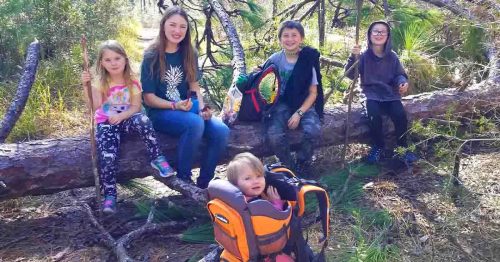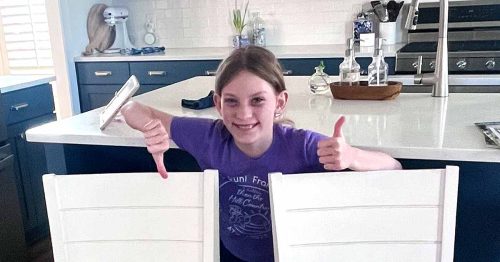What I’ll Take With Me After Military Retirement
Early in our marriage, I recall folding laundry and wondering why my husband had so many green boot socks. Not an excessive amount — just no two pairs the same. Who decided boot socks needed such variety?
Seventeen years later, I’m still cursing those mismatched socks — sometimes under my breath, sometimes not — as I fold endless piles of Marine-green undershirts, silkies and flight suits (always with a pen or earplugs in the one pocket we missed). When my husband retires at the end of the year, I won’t miss any of the laundry. Honestly, not matching those socks might be the part I’m most excited about.
I’d be lying if I said I wasn’t a little sad to leave Marine Corps life. It’s been a part of my husband’s world for 20 years, mine for 17, and all our kids have ever known. Thinking of leaving behind the traditions and built-in community makes me a little teary. I won’t be walking away empty-handed, and I don’t just mean my collection of squadron t-shirts.

When the day comes, I’ll be taking a few things with me:
- The stubbornness. Call it strength or hardheadedness, but this life has sharpened my inability to give up, back down or assume someone else will solve the problem. My family says I was born that way — fiercely independent and not willing to take “no” for an answer — but military life gave me the environment to turn that trait into a skill.
- The resourcefulness. When something needs to get done, I figure it out — usually because I refuse to ask for help 99% of the time. Sometimes as a military spouse, there isn’t someone to ask. During my husband’s deployment, I needed a ladder to paint the tippy top of our living room walls, so I built a (very sturdy) pyramid out of kitchen chairs. When a movie got stuck right before hosting a holiday night for squadron spouses, I cracked open the player and saved the night. Where there’s a will — and there usually is — I’ll find the way.
- The friends. There’s no bond like a trauma bond. Military life puts you through it, and you learn quickly who shows up and sticks around. To those friends, no amount of stubbornness or resourcefulness replaces the need for you. You’re stuck with me — my husband got a new job!
- The appreciation. Coming from a family where so many relatives served in the military, I grew up appreciating the sacrifice. I’ve learned firsthand that the entire family serves in some capacity. Even after I am no longer a military spouse, I will always be grateful for those who wear the uniform and those who love, support, worry about, and follow them around from installation to installation.
- The travel bug. Once our kids were born, I felt an urge to show them the world, and, boy, the Marine Corps gave me a major assist. From the Riverwalk to the Golden Gate Bridge, to Diamond Head, the monuments of D.C., and the shrines and castles of Japan, we have been blessed to check so many bucket-list places off our list. I have no plans to slow down.
- The stories, even the weird ones. How could I forget when our mover packed the roast beef sandwich we bought him for lunch? I can still (unfortunately) smell the box that sat all summer in non-climate-controlled storage. From losing my retainer during our first PCS to still wondering what happened to the lid of my large saucepan in our last, each move left its mark. There are memories that bring belly laughs, great pride and moments where friends became family.
Our family’s wild ride is coming to an end, and it’s bittersweet. My husband’s next career will be his, not our entire family’s lifestyle. We’re stepping into this new chapter together, and this writer is excited to start the next page.
Blog Brigade unites military spouses by creating a community built on shared experiences and mutual support. Navigating the complexities of military life can be challenging, but you don’t have to do it alone. Military OneSource offers valuable resources focused on well-being, readiness, and connection. Explore a range of retirement resources and tools tailored to your needs.















